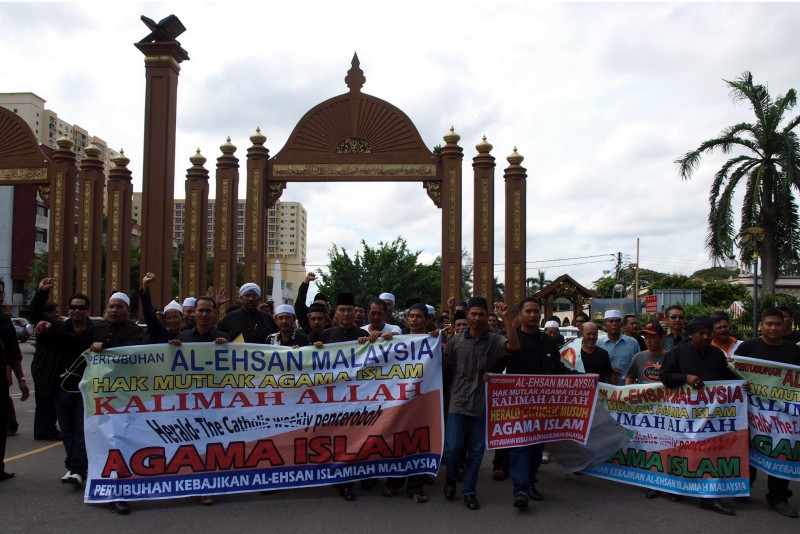 [1]
[1]Members of Al-Ehsan Islamiah Malaysia Welfare Association gather in a peaceful rally protesting the use of the word “Allah” by non-Muslims. Photo by Zulkifle Che Abdullah, Copyright @Demotix (1/6/2010)
The court agreed with the government that the use of the word ‘Allah’ by a Catholic paper would create confusion [4] in the Muslim-majority country:
It is our common finding that the usage of the name “Allah” is not an integral part of the faith and practice of Christianity. From such finding, we find no reason why the respondent is so adamant to use the name “Allah” in their weekly publication. Such usage, if allowed, will inevitably cause confusion within the community.
The Attorney-General interpreted [5] the court’s decision as a move to preserve public order:
…the use of the word “Allah” in the Malay version of the Herald is without doubt, has the potential to disrupt the even tempo of life of the Malaysian community.
…the use of the word Allah as interpretation of the word God or the concept of God by the Herald may cause religious sensitivity and has the potential to harm the public order and safety.
But Rev Lawrence Andrew, editor of The Herald, countered [6] that Malaysian Christians have been using the word ‘Allah’ for many years already:
We have been using this word for nearly four or five hundred years, people have been living in peace and harmony. We have published The Herald for 19 years and we have not caused any trouble.
Rev Dr Eu Hong Seng of the Christian Federation of Malaysia is worried that the court’s decision would undermine unity [7] among Malaysians:
The Bahasa Malaysia-speaking churches have been using the word Allah both before and after the independence of Malaya and the formation of Malaysia. The use of the word Allah by the Malaysian churches had not been an issue all these decades.
However, the various authorities in this country, by making an issue of it and by what would appear to be selective action or inaction, have only encouraged and fuelled further misunderstandings, mistrusts and brokenness between the Muslim and Christian communities. This will only further undermine the unity of Malaysians.
Joe Fernandez debunks the confusion theory [8] which was argued by the court:
The confusion theory does not hold water either because no one anywhere in the world outside Malaysia has raised it as an issue.
Borealis commented [9] that religions don’t need protection:
You can't own a religion, you can only practice it or have faith in it.
Religions don't need protection. Confusing Malaysians by using race and religion issues is too late now because the majority Malays have “awakened”.
Zan Azlee blamed [10] Malay Muslim nationalism:
I, an official Muslim, hereby publicly declare that I have no problems with other religions aside from Islam using the word Allah to refer to God.
In my humble opinion, it is a way for Malay Muslims to show that they are the dominant race and everyone else who are not of that status should be put in their places.
It is sad to see this happening, but I think that I still have faith in Malaysia and the Malaysian people in the grander scale of things.
anas zubedy noted that the issue has further divided [11] the Malaysian society:
…the stances adopted by some politicians, both Muslim and non-Muslim, have exacerbated the situation. Because issues of identity are at the centre of politics and power in our multi-religious, multi-ethnic nation, they are hoping to reap a harvest from the Kalimah Allah controversy. In the process, society is becoming even more polarised along religious lines.
KTemoc believes [12] that the issue should not have been brought in the courts:
I once wrote that religion should be about faith and morality and not legality or for that matter, political approval. Thus I find it unfortunate that the Catholic Herald had taken the issue to the courts. In doing so they have opened a nasty Pandora Box where some innocents may well end up getting hurt.
Bru accuses The Herald of ‘politicizing’ [13] the issue:
…it wasn't the Christians in Malaysia who wanted Allah as their God, it was The Herald, the Catholic Church's official publication, that demanded to be allowed to use “Allah” as and when it saw fit.
But I say The Herald has put Malaysian Muslims and Christians through enough trouble already. They allowed – even encouraged – the whole issue to be politicized and turned into a Malaysian election gimmick.
Mustafa Akyol insisted that there should be no copyright [14] for ‘Allah’:
This is one of the most illogical, insensible and childish decisions I have heard in my life. It is sheer nonsense.
…the Malaysian decision to claim a Muslim copyright for “Allah” is grossly wrong. It is both un-Islamic and irrational. And it only reveals the burning lack of intellectual self-confidence among Muslims, not just in Malaysia, but also elsewhere.
Endy M. Bayuni, editor of The Jakarta Post, observed that there is a rising ‘religious exclusivism’ [15] in both Indonesia and Malaysia:
The problem with religious exclusivism is that it breeds intolerance, which leads to prejudices against the others.
But there is only a thin line dividing tolerance and intolerance, so we should not take this moderation for granted.
With the rising exclusivism that the Muslim majorities in these two countries are pushing, we may be witnessing the Islam in Malaysia and Indonesia becoming less and less tolerant. In fact, it may already be happening.